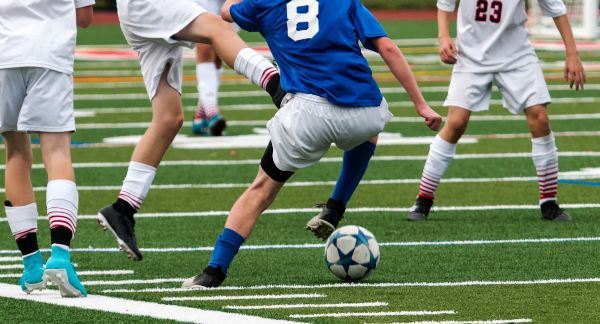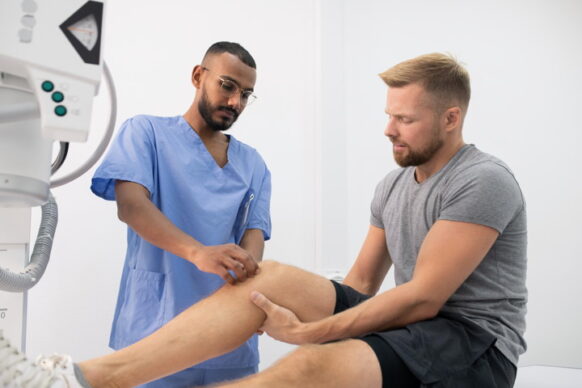Common Youth Soccer Injuries & How to Prevent Them

Youth soccer is one of the most popular and fastest-growing sports in the United States. Soccer helps children develop key skills like agility and coordination and provides a fun outlet for aerobic exercise. Children also learn about the value of teamwork and sportsmanship while helping relieve stress and anxiety.
Despite all the benefits of playing youth soccer, parents should be aware of the injury risks that come with playing the sport. Soccer is a fast-paced game, presenting risk for injury.
Some common injuries include foot and ankle, knee, and head injuries.
This article will examine some common injuries for youth soccer players and provide parents and coaches with tips to keep their athletes safe.
Foot & Ankle Injuries for Soccer Athletes
From minor sprains to more severe fractures, it’s not uncommon for soccer players to experience foot and ankle injuries. These injuries can occur when kicking the ball, quickly changing directions when running, or contact with other players.
Many minor foot and ankle sprains can be treated at home with ice to reduce swelling and with rest. If your athlete cannot put their full weight on the injured foot or ankle, visit the sports medicine specialists at OrthoGeorgia for further evaluation.
Knee Injuries for Soccer Athletes
Knees play an essential role in common soccer movements. Youth soccer players can experience knee injuries after colliding with a player or during quick pivots on the field without any contact.
Some common knee injuries range from mild sprains to more serious ligament tears or dislocations. If your athlete feels or hears a pop during the injury, this may be a sign of a more serious knee injury that an orthopaedic specialist should treat. Contact the sports medicine specialists at OrthoGeorgia for evaluation and to help determine the best treatment options.
Head Injuries for Soccer Athletes
Soccer is a fast-paced game that introduces the possibility of concussions due to collisions. Concussions and other related head and neck injuries can also occur when a player collides with the ball, goalpost, or ground. Athletes may or may not lose consciousness after a concussion, but symptoms include:
- Confusion
- Dizziness
- Grogginess
- Headache
- Irritability
- Nausea
If you suspect an athlete has suffered from a concussion, remove them from the field and seek medical attention immediately.
Injury Prevention Tips for Youth Soccer Athletes
Players can prevent many common soccer injuries by practicing good habits and teaching proper form and skills.
Be sure your youth athletes spend ample time warming up and stretching. Jogging is a great way to increase blood flow and loosen joints before stretching large muscle groups. You can also practice dynamic warm-up exercises like:
- Arm circles
- High knees
- Hip circles
- Lunges
Trust the Sports Medicine Specialists at OrthoGeorgia!
You don’t have to travel far to provide your family with expert sports medicine care. OrthoGeorgia has Sports Medicine Board-Certified, and Fellowship-Trained Orthopaedic Surgeons committed to preventing, caring for, and rehabilitating all athletic injuries.
Our team focuses on helping athletes of any age return to play with the full range of motion, strength, endurance, and function they had before the injury. OrthoGeorgia’s sports medicine physicians, trainers, and therapists all work together to design a customized sports medicine rehabilitation program for your specific needs.
Choose Sports Medicine Experts that Keep Your Family Active. Call Us at (478) 745-4206 Today!

Personalized Orthopaedic Care in Central Georgia
At OrthoGeorgia, we want to help you live a healthier and more comfortable life by giving those in Macon, Warner Robins, Kathleen, Milledgeville, Dublin, Hawkinsville, and the surrounding areas convenient access to the highest quality care. Whether you have been suffering from a sports injury or a common orthopaedic condition, we will determine the cause of your discomfort and craft a personalized treatment plan to bring you relief. To learn more about our services and our physicians, or to schedule an appointment at OrthoGeorgia, please contact us today.







